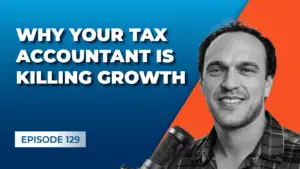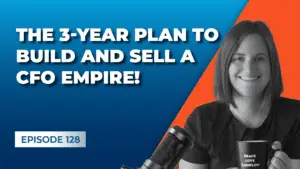
Everyone who works in finance quickly discerns the value of cash. It doesn’t take a genius to figure out that cash is what keeps your business alive. Some people might even say that cash is king. What isn’t always clear is that there are many different ways to understand how cash affects your business.
Today, we explore the subtle distinctions between cash, cash flow, and profit. Together, these three forces can work together to give you a clearer and more nuanced picture of the status of your company. We’ll also throw in some tips on how to actively work with cash to create some flexibility and freedom if you ever find yourself in a tight spot.
On this episode you’ll hear:
- The difference between cash and cash flow
- The importance of cash flow
- The amount of cash you should have saved up
- The difference between cash and profit
- The best ways to maximize your cash
If you’re looking for a more comprehensive understanding of the role cash plays in your company, then this is one episode you won’t want to miss.
Resources
Transcription of This Episode
The Gross Profit Podcast is your one stop shop on the path to profitability. Each week we share authentic advice on the positive practical steps you can take to make the company you love more profitable. If you’re looking for a positive plan to help you avoid common spending mistakes, control costs, and increase your profits, then this is the place for you.
I’m Ryan Cowden and this week we’re joined by James Kennedy and Garret Carragher. In this episode of the Gross Profit Podcast, James and Garret discuss the main differences between cash, cash flow and profit.
Everyone who works in finance quickly discerns the value of cash. It doesn’t take a genius to figure out that cash is what keeps your business alive. Some people might even say that cash is king. What isn’t always clear is that there are many different ways to understand how cash affects your business. Today we explore the subtle distinctions between cash, cash flow and profit. Together these three forces can work together to give you a clearer and more nuanced picture of the status of your company. We’ll also throw in some tips on how to actively work with cash to create some flexibility and freedom if you ever find yourself in a tight spot.
On this episode, you’ll hear the difference between cash and cash flow. While cash is the amount of money you can access in the bank at any one time, cash flow refers to how money is moving across your company over a period of time.
Next we’ll discuss the importance of cash flow. Cashflow is the lifeblood of your company and you can’t survive very long without it.
Then we’ll share the amount of cash you should have saved up. You’ll want enough reserves in the bank to make it through one to two months. That way, even if you brought in absolutely no money, which is highly unlikely, you’d still be able to operate for a significant period of time.
After that, we will talk about the differences between cash and profit. While cash is something that goes in and out of your company, profit is an assessment of the health of your company during a determined period of time.
And finally we’ll offer up some of the best ways to maximize your cash. We’ll share tips about how to extend your payment period, how to get lines of credit and how even leasing instead of buying might be the right choice for your company.
If you’re looking for a more comprehensive understanding of the role cash plays in your company, then this is one episode you won’t want to miss. There’s a lot of actionable advice in this episode, so grab something to write with because you’re going to want to take notes. As always, I’ll be back on the other side to wrap up any loose ends. So without any further ado, here’s our conversation with James and Garret.
So welcome back to another episode of the Gross Profit Podcast. I am your host, James Kennedy, CEO of www.procurementexpress.com and I am joined again by Garret Carragher, the secret CFO. Garret how are you feeling today?
Feeling great Jim. It’s been great. Really excited about today’s topic. I think we are talking about cash.
We are talking about, did you ever hear the expression ‘revenue is vanity, profit is sanity, but cash is king.’
Exactly. You couldn’t have said it better myself.
We’re going to dig into that and talk about cash and cash flow. I’m going to ask you a few questions here, just to discuss it. So let’s start off with, I mean what’s the difference between cash and cash flow?
The difference between cash and cash flow. So cash is really the amount of money you might have in your bank account at any time. Your business bank account. And that’s just showing you what the balance is at that time.
Cash flow then is really the movement of that cash. So when you look at cash flow, you’re thinking about, ‘What am I going to receive in, in the short to medium term.’ So thinking in the next, usually people would do a 12 week cash flow or a three month cash flow. So you’re thinking about what am I going to receive in within those next 12 weeks and what am I going to pay out within those next 12 weeks?
Okay, so when people say cash flow, why is that important? What makes cash flow so important?
Cash flow and cash is incredibly important for a business, it’s really the lifeblood of any business. Because without cash, your business is going to close pretty quickly. You need cash to pay your suppliers. You need to understand what your employees are going to get paid over the next week, fortnight or month. You need to build that into your cash flow. And also you need to understand what you’re going to receive in over that period of time so that you can match your outflows with your inflows and make sure you always have a nice cash balance in your bank account.
The difference from big business to small businesses. Big businesses want to have cash flow, so maximize their cash so they look like they understand what they’re doing. They have a good, strong business and it’s generating a lot of cash, which shows you have a strong hold on your accounts and your billings good, you’re selling stuff that people want.
For smaller businesses it’s really about staying afloat and make sure you have enough to pay your employees at the end of the month or the end of the fortnight that you can also pay your suppliers. So really an incredibly important topic and something I’m sure a lot of people are monitoring on a weekly basis, monthly, certainly if not weekly.
Yeah cause it gets … I guess when we’re looking at our accounts, it gets … From a business, someone on the executive team, really all I care about, as long as there is enough cash or enough, let’s say enough runway, whatever, six or 12 months of cash to pay everyone and keep the lights on and so on, that’s all I care about.
And then the profitability is kind of separate. You look at profitability depending on what you’re doing in the business. Do you want to be profitable or you’re putting that back into growth.
But really it’s just, I mean it’s really just a waterline, right? I guess you should, everyone should have an idea in their mind how much cash do I want to keep in the bank for contingency and then just for wages, et cetera. Versus how much risk am I willing to take on assuming that more money is going to come in the future.
Yeah.
So would you say that, I mean, would you say a business should have, what’s a good sort of bank of cash to have based on overheads. Would you say, ‘Okay. 12 months worth of overheads’. Three months, six months?
Yeah. So the way that a business might work it out, the way I usually work it out, I would look at my burn rate in a month. So I would look at how much cash I go through in a month. So that would mean, how much am I paying out in a month?
So I’d look then at people’s salaries I’m paying out in a month, how much I’m paying suppliers. That kind of information and that would give me a good idea of how much I would need to hold per month to allow the business to continue on if we receive nothing in. Now that’s incredibly unlikely, you’re getting nothing in a month. But just, it’s a good idea to have that in your mind. So say, you had a business and you were burning through half a million per month, so you’re paying out a half a million per month. Then it’s up to you to decide how many months do I want to hold in cash, so that I can run the business even if I received nothing in. Okay.
So you know, that’s for each business to decide. I don’t think you need more than maybe one or two months max. Maybe even one month is enough, you know, because if your business is trading normally and things are going okay and there’s nothing strange going on, then one month is more than enough. So even if no one paid you in a full month, you could pay everyone, pay all your suppliers, pay your employees and run through into the next month and then you start receiving money again. And that would really be an exceptional circumstance that something like that would happen.
Now it does happen to businesses and I know in Ireland SMEs get the raw end of the deal a lot with bigger companies and what’ll happen a lot with bigger companies is they will try and maximize their cash at the end of the year. So say that’s a calendar year, say their year matches up to the calendar year in December. And what will happen a lot of these big companies is they want to maximize their cash in December and actually they won’t pay any suppliers, especially small ones who don’t have any leverage, don’t pay them any money in that month.
And in fact this week I was meeting with a large customer of ours and I put that question to them. Because I know what happened in last year and I said, ‘Look, when it comes to December this year are you going to stop paying us, so that you can maximize your cash? That caused a lot of hassle last year.’ And they all started laughing but said, ‘That comes from higher up the food chain’. But in fact I suspect it’s going to be the same again this year. So you need to make preparations for that and understand that and by so by holding one month’s burn rate, holding that in your accounts will allow you to get through that tight month and then you’re back on track for the next month, you know?
I mean leverage is an important point there and I mean if you’re running a business, you have think about how can you maintain your leverage with your customers. You should come to that, right? Some way of turning off the service or have some thing to make sure that you’re on that strategic list of suppliers. Their strategic list of vendors as opposed to a commodity in some way.
Okay. Well that’s good. How about … I’ve got a few more questions here or one more question actually, which is really got a couple of points in it. So we’ve all agreed, obviously cash is king. That’s the thing that can kill you I guess. Profit is it a bit more slightly more esoteric I guess. More relates to the value of the business. Your profit really is important if it comes to sale event or it comes to trying to raise cash, would you say? That’s when profit matters?
Yeah, exactly. Yeah, so profit is is is very different from cash. A lot of people get it mixed up. And the difference is that cash is really what’s going on in your money in cash terms, but profit is you’re trying to match your costs, your revenue in a particular period, in a particular time.
So a quick example of that one might be I incur some costs to a have some training in August, and I don’t get the invoice from the person providing that service for a month and then I don’t pay it out for another two months. So your cost of the training was actually done in August. So you should actually reflect that back in August when the cost was incurred because that’s the time the work was done and that’s the time you actually owe the liability from and that will affect your profit in that month.
But in cash flow terms you haven’t actually paid it out for another two or three months. So in cash flow terms, you reflect that later down the line.
So that’s the difference between cash and profit. At the end of the year, companies or investors or people looking at your business will want to see what your profit is. And at that time you may again in December or whatever, you may have costs incurred but you’re not might be paying them out to the January or February. But you need to reflect that again, back in the year, cost was incurred. That was the time the liability was incurred, you owe that money and you need to reflect it back then at that time period.
So how do you maximize your cash?
Okay, so if we think about our cash then, how are we going to maximize our cash? Well, there’s a couple of simple ways to do it.
First one is to not pay out any money. So that is always the winner in my book. So the way you can do that is you can look and you have so many suppliers, so which suppliers will give you the longest credit. And if they don’t give you good credit terms, how can extend the credit terms with them? What can you do for them that allow you to extend the credit? Sometimes it can be warped, even paying a bit more for a product if they allow you to extend the credit terms by another month or so. Allow you to have those extra days grace, that can be really important for a company.
Companies can go into a thing, I don’t know if I mentioned it, which is like overtrading and that’s where you’re selling so much that you run out of cash. So you can actually put all your money in and you’re selling and selling and selling and buying and buying and buying but you’re waiting to get paid from your customers. And then you have to pay out your suppliers and you end up in the term overtrading, where you run out of cash, you’re actually waiting to get paid from your customers. So your money is going to come in. But in the short term you’ve actually run out of cash in that’s known as overtrading. So you can try and avoid that or mitigate the risk that by having good payment terms with your suppliers.
The next step is obviously you’re supplying somebody else. So you want to be able to get the money off them as quick as you can. So you know, you want a good accounts receivable team, a good credit control there where people are ringing up, putting in the invoices, everything needs to be super clean. Have you got a PO to supply the service? Did you send it the PO, did you receive a PO in from the customer? Does the PO match what your invoicing? Does the value much in quantities? Does the value match in euros or dollars or whatever you’re invoicing in? Have you invoiced the right company? How have you sent the invoice on time? When was it sent out? All these things matter so much for getting in cash. It might seem trivial at the time but if you send out the invoice to your customer that has the wrong PO number on it or the wrong values or, it goes to the wrong person, that can extend out you getting paid for a month, maybe a few weeks or a month or two. And that really affects your cashflow. So it’s all about being super clean, best practice, everything up to date.
So that’s two there. So number one is extend out your payment terms with your suppliers. Number two is make sure your cash collection is best practice and running super smooth. And finally then, another way you can maximize your cash is to get credit with some bankers, some investors or wherever you can get credit with.
So we can think about, we can get a simple one as like an overdraft. So again, we can get an overdraft facility put in place for a bank. We can look at invoice discounting where we can settle our invoices and then receiving the money immediately. Usually getting maybe 80% of your invoice immediately.
We can also look at it maybe medium term debts so we can look at getting a term loan. So that’d be good on if you had some kind of fixed assets, so you bought a building or land or property or whatever and you can get a term loan on that. So instead of using cash in the business to buy the property, you just get a term loan for a million or half a million, or whatever it is, and use that to finance that asset over maybe 10 years.
And another way then to maximize your cash is to go down the leasing route. So if you have a lot of vehicles or a lot of equipment, they can actually lease it and you pay so much every month for the item. It does cost you more. There’s no question about it. You know, when you’re getting a vehicle or whatever through that route but from a cash flow point of view it’s fantastic because instead of you paying a 20, 40, 50 grand for a particular vehicle, you end up paying 5-600 quid a month, over a number of years and that can really help a business which is growing and doesn’t have the cash to invest in these assets.
Very good. There are some great practical tips. I think we’ll probably dive into some of them in subsequent episodes, maybe at a different times so that, of ways of extending your credit or different types of credit or debt that’s available. Thanks Garret.
No worries, thanks James.
So if anyone else wants more tips on how to improve cash flow in your business along with the other advice on making a more profitable business, you can get our book. It’s your book on Kermit express.com. Get a free chapter on negotiation, which I highly recommend you give to anyone in your organization who’s doing any purchasing and until then we’ll see you next time.
All right, see you. Take it easy James.
All right, folks, there you have it. That wraps up our conversation with James Kennedy and Garret Carragher. They shared a ton of valuable insights and advice today on cash, cash flow and profit. We also shared some tools and resources which will all be linked up in the show notes. Don’t forget to click on one of those links to get a free chapter from the book Profit Leaks By James Kennedy and Garret Carragher. I hope you enjoyed our conversation. Please consider subscribing, sharing with a friend or leaving us a review in your favorite podcast directory. Until next time. Best of luck in all that you do and we will look forward to seeing you on the next episode of the Gross Profit Podcast.




